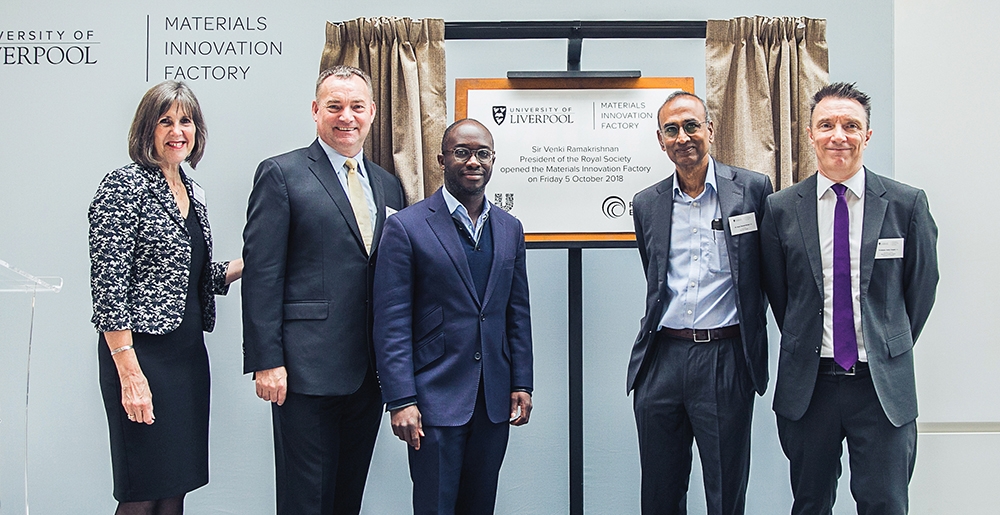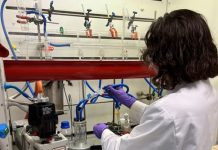The University of Liverpool’s Materials Innovation Factory, an £81 million facility dedicated to the research and development of advanced materials, has been officially opened by the President of the Royal Society and Nobel Laureate, Sir Venki Ramakrishnan.
A collaboration between the University and Unilever, the Materials Innovation Factory brings together materials chemistry expertise with the latest computational and robotic equipment to accelerate research and reduce the time it takes to develop new products which have the potential to address a range of societal challenges.
The 11,600m2 state of the art facility represents a 21st century research environment providing laboratory and office space for University researchers and Unilever scientists from the global Research and Development (R&D) Centre for Home Care and Personal Care products in Port Sunlight.
In addition, the facility, which boasts one of the highest-concentrations of materials science automation robotics in the world, can also accommodate other academic or industrial users on a flexible, open-access basis to facilitate cross-disciplinary collaborations, innovation and knowledge exchange.
Sir Venki Ramakrishnan, President of the Royal Society and Nobel Laureate, said: “The strength of material science in the North West is, to a great extent, built on the collaboration between academia and industry which is so well embodied in the Materials Innovation Factory.
“Whether it is human health, sustainability or a range of other areas, advanced materials offer tools by which we can tackle some of the big challenges we face on the global stage. The range of expertise here in Liverpool can make a big contribution to meeting those challenges and to driving economic growth.”
Professor Dame Janet Beer, Vice-Chancellor of the University of Liverpool, said: “The opening of the Materials Innovation Factory is an important milestone for the University of Liverpool. The institution is known for its world-class research in advanced materials and these impressive new facilities will serve to further accelerate progress.
“The applications for our research in this area are truly exciting, with the potential to answer some of the greatest challenges facing the world today in fields such as sustainable energy, healthcare and manufacturing.”
David Blanchard, Chief Research & Development Officer at Unilever, said: “This is an important next step for the partnership between Unilever and the University of Liverpool and a signal of our continued commitment to investment in the UK. With the world changing and innovating at a rapid pace, it’s key for Unilever R&D to work closely with strong, expert partners. The Materials Innovation Factory is a best practice example of this type of collaboration.”
Sam Gyimah MP, Science and Universities minister said: “This inspiring facility bring together some of the UK’s most talented scientists and academics, with cutting edge robots and computers, to meet the future challenges our society will face.
“I want to see the UK continue to grow its reputation as an innovation superpower and with government and private sector investment in new research facilities like this one in Liverpool, we are striving towards our ambition for 2.4% of GDP to be spent on research and innovation by 2027.”
Located in the heart of the city’s Knowledge Quarter, the Materials Innovation Factory was awarded £11m through the government’s UK Research Partnership Investment Fund (UKRPIF), a programme administered by Research England (formerly HEFCE), which helped secure significant private co-investment towards the project.
It also houses the Liverpool contribution to the Henry Royce Institute, a national institute for materials science research and innovation.
Research activity in the Materials Innovation Factory spans the fields of organic materials, inorganic materials, nanomedicines, sustainability, genomic sequencing and high throughput formulation.
In particular, two world leading research groups, led by Professors Andy Cooper FRS and Matt Rosseinsky FRS, are creating innovative new materials with a range of uses: from porous molecular organic solids and liquids which can capture harmful pollutants to new materials for the harvesting, storage and conversion of low-carbon energy.
The Leverhulme Research Centre for Functional Materials Design, created to drive a design revolution for functional materials at the atomic scale, is also located in the facility.










